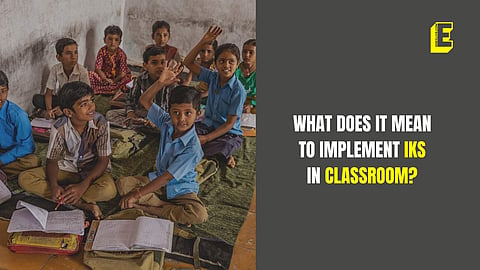

Indian Knowledge Systems (IKS) are the knowledge systems that have evolved in India over thousands of years. They are based on the accumulated knowledge of generations of people living in harmony with nature. IKS encompasses a wide range of knowledge, including traditional medicine, agriculture, forestry, water management and conservation.
There are a number of challenges to implementing IKS in colleges in India. Some of these challenges include:
Lack of awareness and understanding of IKS: Many people, including college administrators and faculty, are not aware of IKS or its importance. This lack of awareness and understanding can make it difficult to implement IKS in colleges.
Lack of resources: IKS is often undocumented and passed down orally from generation to generation. This makes it difficult to develop and implement IKS-based courses and programmes in colleges. Additionally, there is a lack of funding for IKS research and education in India.
Resistance to change: A few people may be resistant to the idea of implementing IKS in colleges. They may view IKS as outdated or irrelevant. Additionally, a few faculty members may be reluctant to change their teaching methods and curriculum to accommodate IKS.
Language barrier: IKS is often transmitted in Indian languages. This can create a language barrier for students and faculty who do not speak these languages.
In addition to these challenges, there are a few other factors that can make it difficult to implement IKS in colleges in India:
The colonial legacy: The British colonial education system in India was designed to replace Indian knowledge systems with Western knowledge systems. This legacy has created a bias against IKS in the Indian education system.
The focus on Western knowledge systems: The Indian education system is still largely focused on Western knowledge systems. This can make it difficult to accommodate IKS in the curriculum.
The lack of qualified faculty: There is a shortage of qualified faculty to teach IKS courses in colleges. This is because IKS is not widely taught in universities in India.
The implementation of IKS in colleges in India can offer a number of benefits. IKS can help students to learn about their cultural heritage and to develop a deeper understanding of the environment. Additionally, IKS can provide students with the knowledge and skills they need to tackle the challenges of the 21st century, such as climate change and food insecurity.
The Indian government has taken some steps to promote the implementation of IKS in colleges. For example, the new National Education Policy (NEP) 2020 calls for the integration of IKS into the curriculum. However, more needs to be done to overcome the challenges and to implement IKS in a meaningful way.
